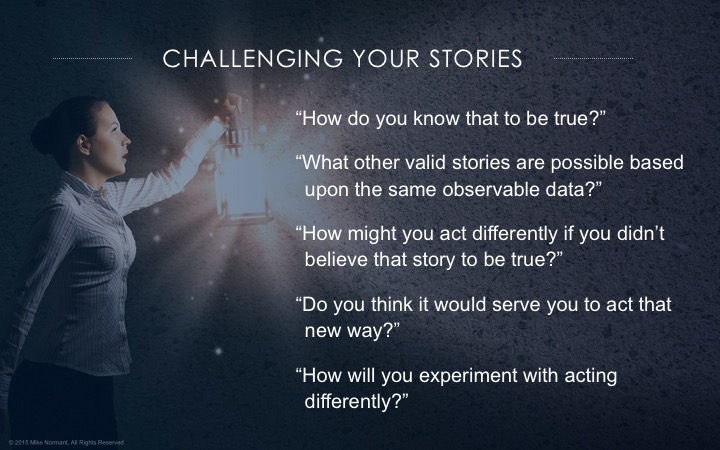We are sense-making creatures. Our brains are wired to help us navigate our lives by creating stories to make sense of our world and our day-to-day experiences. The self-awareness to see when you are telling yourself a story is powerful. It’s even more powerful to have a simple tool to help you challenge those stories and assess their level of “truthfulness.”
Today I’ll share one tool – a set of questions – that you can use to challenge your stories.
How We Operate – The Ladder of Inference
I’ve written about the Ladder of Inference before. We all take in ‘data’ and experiences, much like a video-recorder would capture them. We then respond / act based upon that input. However, a lot takes place in our brains (sometimes in the blink of an eye), in between the stimulus and response.
In that blink of an eye, we add meaning (assumptions, conclusions, opinions, beliefs) to the observable data, based on our own Ladder of Inference. These are our stories. This Ladder – and our stories – are 100% unique to each of us as they are built upon our own life experiences.
We tend to operate as if our stories are facts, or what I call “capital T” Truth. But these stories are often just our truth, with a small t.
Quick Example
I assume you can relate to this one. You’ve sent an email to somebody (Jack) and did not receive a response. Based on this you know that Jack is mad at you. It’s the Truth. Hence, you act accordingly. You start to avoid Jack in order to ensure you don’t have an unpleasant encounter. After all, he is mad at you.
Challenging Your Stories
Once you start to be more aware of your stories – and see them as stories rather than the Truth – the door opens to begin to question or challenge them.
This will allow you to more objectively evaluate just how “truthful” your stories are. By stepping back, you often find that your assumptions aren’t the Truth (with a capital T). This realization can allow you to experiment with how you might respond or act differently to whatever situation you are faced with.
Here’s a go-to list of effective questions that you can use to challenge your stories:
1. How do you know that (story – whatever you are thinking) to be true?
2. What other valid stories are possible based upon the same observable data?
3. How might you act differently if you didn’t believe that story to be true?
4. Do you think it would serve you to act that new way?
5. How will you experiment with acting differently?
For question #2, the goal is NOT to create a laundry list, but to come up with at least one or two. Just knowing that there are other possible stories loosens your brain’s “lock” on your story being the Truth (capital T).
In question #5, the word “experiment” is important. If you think about a scientist conducting an experiment, there is never a “failure.” Although the outcome may not be what was intended or hoped for, the experiment reveals information / an outcome. In this spirit of experimentation, it can be easier to go for it and to review what happened with a neutral non-judgmental stance.
Question #5 leads to an action. Walking through the five questions should always result in an action that moves you forward.
Summary
We are wired to create stories to make sense of our experiences. Our own Ladder of Inference is generating stories (assumptions, opinions, conclusions, beliefs) on an ongoing basis.
Being able to see when you are treating your stories, your truth, as the Truth, is great self-awareness. Taking the next step to challenge those stories, to assess their level of truthfulness, can serve you.
In my next blog, I will share a detailed example of how to use the five challenging questions I introduced above.
